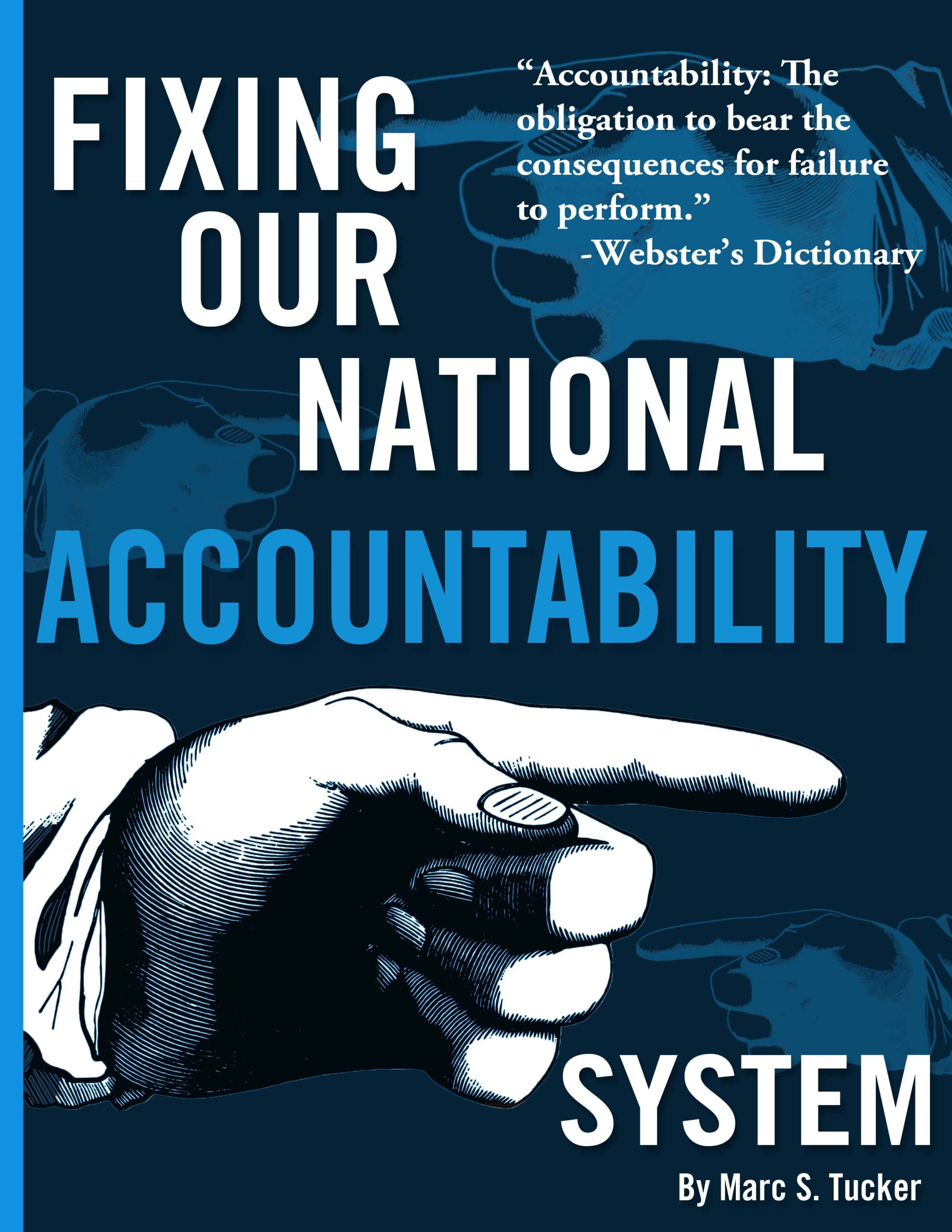In this new report, Marc Tucker, NCEE’s President, calls for replacing the current system of test-based accountability with a system much more likely to result in improvements in student performance. Tucker points out that the current system has not only failed to improve the performance of the at-risk students it was designed to help, but has alienated the best of our current teachers and created an environment in which able young people choosing careers are less likely to choose teaching.
The report explains that the countries in which student performance is outstripping the achievement of American students are not using accountability systems like ours, which they view as more appropriate for industrial-era blue-collar workers than the kind of professionals they want in their schools.
Fixing Our National Accountability System argues for a much needed alternative to the kind of punitive accountability measures now dominating American policy. Fixing accountability will not just require a different accountability system but a different kind of education system altogether.
In Praise of Fixing Our National Accountability System
Marc Tucker has once again authored a thought provoking piece. The premise is that we must look at the entire education system and not put blame on individuals for the failures of the U.S. Education system. Marc is clear that nations outperforming the U.S. provide examples that we need to study. This piece is a must read for policymakers as they chart the course for next generation accountability systems.
Terry Holliday, Commissioner of Education, Commonwealth of Kentucky
Marc Tucker and NCEE take a massive and authoritative step in the right direction for teacher quality, higher standards and more equitable outcomes by setting out the overwhelming evidence for a new and better system of educational accountability. Instead of blue-collar and bureaucratic accountability, Tucker shows, we need responsible professional accountability that will build excellence among the many rather than skewing a whole system in the wrong direction by punishing and haranguing a wayward few. Tucker’s reasoning is not sentimental or ideological but just relentlessly consistent with the evidence of high performance everywhere.
Andy Hargreaves, Brennan Chair in Education, Boston College and co-author of Professional Capital: transforming teaching in every school
Marc Tucker will strike a chord with those who want the next version of accountability for public education to lead to real fixes rather than Band-Aids for the current system. Fixing Our National Accountability System delivers far more than a suggestion based in theory; it defines a fact-based, attainable solution that recognizes students’ responsibility in their own education, respects educators as true professionals, requires honest assessments of struggling schools’ needs, and offers a common-sense role for testing. True to form, Tucker also delivers tough medicine for us all to swallow and I applaud his candor in highlighting a plan with promise.
Dennis Van Roekel, Outgoing President, National Education Association
As usual, Marc Tucker has provided all of us an effective, fact-based way forward, this time in the area of accountability. Until we start to amend our shortsighted, top-down approach in America and start to involve the field of educators, we will not succeed. Marc cites lessons from the top-performing countries of the world. State leaders should not just listen to Marc, they need to take action!
David Driscoll, Former Massachusetts Commissioner of Education
There are few, if any, aspects of the American education system during the past decade that have been more debated than accountability. Test-based accountability that relies on frequently employed standardized assessments has in many ways taken away much of the professional responsibility and pride that most teachers claim are the moral drivers of the teaching profession. Fixing Our National Accountability System takes a critical look at the current accountability policies in the United States and offers a welcomed plan that is based on practices and models in the most successful education system globally. One of the advantages of this plan is a shift from bureaucratic consequential accountability to more professional peer-to-peer responsibility in all American schools.
Pasi Sahlberg, Author of Finnish Lessons: What can the world learn from educational change in Finland
NCEE’s report offers a cogent critique of the negative consequences on teaching and learning that have been produced by our nation’s current regime of standards and assessments. The report’s recommendations offer a feasible and constructive path toward building an accountability system that will guide teaching and learning and foster meaningful support for school improvement and accountability.
Warren Simmons, Executive Director, Annenberg Institute for School Reform, Brown University
This paper makes a powerful case that the United States needs to rethink its education accountability system. Tucker traces the way the thinking about accountability in business has changed over the last century and suggests that the schools might take a look at that evolution. You may agree or disagree with Tucker’s recommendations, but, either way, this is a paper you ought to read.
Governor John Engler, President, Business Roundtable
As always, Marc Tucker’s analysis of the problem – in this case educational accountability and testing in America – and his proposed solutions are insightful, provocative, and worth serious consideration. He doesn’t shy away from the need for accountability or the use of test score data in such a system. Rather, he asks who should be accountable for what and in what ways, drawing upon examples from across the globe. And he proposes building an integrated system where assessment is balanced in its use such that it supports teaching and learning in contrast to the current practice of using test score data to denigrate the very individuals entrusted with the role of educating our youth.
James W. Pellegrino, Co-Director, Learning Sciences Research Institute, University of Illinois at Chicago
Marc Tucker is one of our nation’s most creative thinkers about education. In this provocative report, he draws on global strategies to paint a picture of one new approach to accountability in education. His ideas for building and supporting a strong profession of teaching and using fewer and more thoughtful assessments to inform school improvement hold the seeds of a more productive path forward.
Linda Darling-Hammond, Charles E. Ducommun Professor of Education and Founding Director, Stanford Center for Opportunity Policy in Education
It will not be possible for the United States to compete successfully in global commerce if it continues to recruit its teachers from the lower ranks of its high school graduates, trains them poorly and pays them far less than its high status professionals. To hold our teachers accountable for the poor performance of America’s students under such conditions is unfair and foolish. This report lays out a plan for rebuilding the American education system that rests on the same kinds of policies being pursued by the countries that are eating America’s lunch. We should be implementing these policies with all deliberate speed.
William Brock, Former U.S. Senator and Former U.S. Secretary of Labor
Mr. Tucker makes a bold statement that it is now time to look at this country’s educational accountability system, and consider a re-design from the ground up. Much has been positively accomplished under the current No Child Left Behind model, however, as educators and leaders seek to innovate, creating systems that will ensure that students are at the center of the learning environment and that each student leaves K-12 education competent and confident, ready to succeed in either college or career, a one-size fits all model will no longer work. We truly need to engage students, educators, parents, and other key stakeholders in this re-design. This report makes a strong and elegantly written case for change.
Virginia M. Barry, Commissioner of Education, State of New Hampshire





